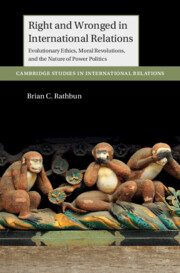 Right and Wronged in International Relations
Right and Wronged in International Relations Book contents
- Right and Wronged in International Relations
- Reviews
- Cambridge Studies in International Relations: 163
- Right and Wronged in International Relations
- Copyright page
- Dedication
- Contents
- Figures
- Tables
- Acknowledgments
- 1 The Nature in and Nature of International Relations
- 2 Lesser Angels
- 3 Mankind Is What Anarchy Makes of It
- 4 See No Evil, Speak No Evil?
- 5 To Provide and to Protect
- 6 Just Desserts in the Desert
- 7 Barking Dogs and Beating Drums
- 8 Biting the Bullet
- 9 Dying in Vain
- 10 Daily Bread
- 11 From Demonizing to Dehumanizing
- Index
- Cambridge Studies in International Relations: 163
3 - Mankind Is What Anarchy Makes of It
The Material Origins of Ethics
Published online by Cambridge University Press: 29 July 2023
- Right and Wronged in International Relations
- Reviews
- Cambridge Studies in International Relations: 163
- Right and Wronged in International Relations
- Copyright page
- Dedication
- Contents
- Figures
- Tables
- Acknowledgments
- 1 The Nature in and Nature of International Relations
- 2 Lesser Angels
- 3 Mankind Is What Anarchy Makes of It
- 4 See No Evil, Speak No Evil?
- 5 To Provide and to Protect
- 6 Just Desserts in the Desert
- 7 Barking Dogs and Beating Drums
- 8 Biting the Bullet
- 9 Dying in Vain
- 10 Daily Bread
- 11 From Demonizing to Dehumanizing
- Index
- Cambridge Studies in International Relations: 163
Summary
Evolutionary psychologists have long maintained that humans’ moral sense is essential to their success as a species and part of what makes humans unique among animals. Moral systems have functional roots, helping individual organisms survive, thrive, and pass on their genetic material. It is not despite anarchy but because of anarchy that humans have an ethical sense. Evolutionary theorists identify moral condemnation and binding morality as crucial for the emergence of other-regarding, altruistic behavior that makes liberal morality possible in the first place. When others harm us, or even third parties, we condemn, passing moral judgments and sometimes retaliating; we do not speak evil but speak of evil. Moral condemnation encouraged the development of moral conscience to avoid the outrage of, and often violent group punishment by, those who were wronged. This internalized sense of right and wrong in turn acted as a credible signal of cooperativeness that unwittingly and unconsciously paid material dividends. Group favoritism, also thought to have evolutionary origins, is moral in nature as well. Those early humans who felt obligated to contribute to the collective defense against common threats in an extremely dangerous environment could prosper enough to offset the competing incentives to free-ride within the group.
Keywords
- Type
- Chapter
- Information
- Right and Wronged in International RelationsEvolutionary Ethics, Moral Revolutions, and the Nature of Power Politics, pp. 65 - 97Publisher: Cambridge University PressPrint publication year: 2023
